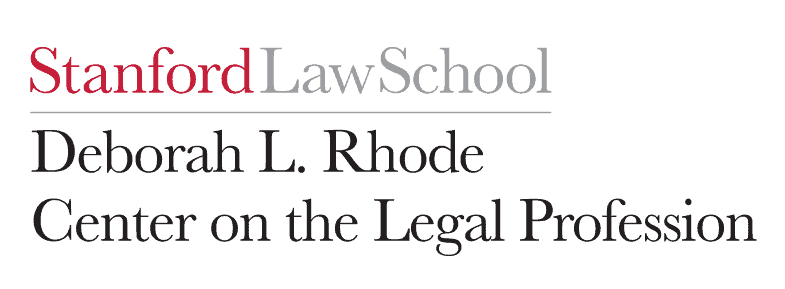by Kelsea Jeon, Civil Justice Fellow
Last term, the Rhode Center hosted a lunch talk at Stanford Law School on “Access to Justice: Crisis and Crossroads.” During the hour-long discussion, Professors Nora and David Freeman Engstrom, Lucy Ricca, and Todd Venook introduced the audience of primarily first-year law students to the access-to-justice crisis and laid out the myriad of ways the Rhode Center is tackling the issue.
Professor Nora Engstrom began the talk with a nod to the late Deborah Rhode, who once noted the “shameful irony that the nation with the highest concentration of lawyers fails so miserably to make their services available to those who need them most.” Professor Engstrom then presented the audience with statistics capturing the extent and severity of the access-to-justice crisis–in approximately 75% of civil cases in state court, at least one party is self-represented. These cases in civil court touch on significant aspects of people’s lives. The vast majority of civil cases in state court are debt collection actions, where most debtors are unrepresented, and which could lead to wage garnishment. Not only do debt collection actions take place in state courts, but so do evictions and child support matters, among others. And in these evictions, 98% of tenants are unrepresented, and in child support cases, 95% of parents are also unrepresented.
Next, Todd Venook presented a case study diving deeper into the problems with debt collection actions. He noted the rise of debt claims in state courts over the past decade and highlighted the disparity between parties on both sides of the v. Plaintiffs are increasingly institutional debt collection companies—as opposed to the original creditors—and defendants are almost exclusively unrepresented individuals, many of whom are people of color. What usually happens in these cases, Venook pointed out, is wage garnishment for the defendants.
After the deep dive into debt collection matters, Lucy Ricca presented one of the potential solutions to the access-to-justice crisis. Given that unauthorized practice of law rules in many states restrict non-lawyers from providing legal advice, advocates have been creatively thinking about how to reform regulations on who could provide legal help. The Rhode Center has been at the center of the research and policy work in this area. Ricca proposed three emerging categories of regulatory reform—from the allied legal professionals who are licensed legal paraprofessionals, to justice workers who are lay community-based providers, to finally organizational entities which have nonlawyer owners/investors and/or use nonlawyer providers.
Finally, Professor David Engstrom closed the presentation by pointing out the role of state courts, who are feeling increasing pressure from the pro se crisis to reform, and of technology, especially generative artificial intelligence given its capabilities in helping self-represented litigants, in addressing the access-to-justice crisis.
The access-to-justice problem is a complex issue with entwined contributing factors, and accordingly, the Rhode Center has been tackling the issue from a variety of angles. For those eager to join the efforts of the Rhode Center, here are some ways to get involved: taking courses including the Winter/Spring Policy Lab: “Expanding Access to Justice in Eviction and Family Law” and the Spring Course: “Access to Justice: Law, Policy, and Legal Ethics”; applying to the Rhode Center Civil Justice Fellows Program in the Spring; and finally, staying in touch with the Rhode Center online. We hope to see you soon!
